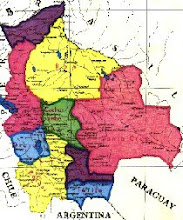Morales accepts recall plan
In a surprising new twist to Bolivia's political struggle, President Evo Morales agreed to a recall referendum in which he and the nine departmental prefects would all submit themselves to the judgment of voters.
The exact terms and date for such a recall weren't immediately known, but presumably office holders who received less than 50 percent of the vote would have to step down. Press accounts indicated the vote would take place in late July or early August.
It would represent a sort of "Gunfight at the OK Corral"-type scenario for settling the standoff currently forming between the president and the four departments that have determined to hold referenda on whether or not to become "autonomous."
One of the provinces, Santa Cruz (where we live), has held its referendum, and autonomy "won" with over 85 percent of the vote, although the President insisted that the referendum was illegal and the result inconclusive because only about 65 percent of eligible voters turned out. (The exact meaning of autonomy is not clear. For a further discussion of it see the "Main Story" below.)
The idea of the recall referendum is not new. Morales proposed it in December, and it was tabled at the time while attention focused on the autonomy votes, which will be completed by June 22. The opposition-controlled Senate, apparently buoyed by the vote in Santa Cruz and annoyed by the president's intransigence, revived it Thursday, and the President approved it.
It will be an interesting test of strength with the outcome far from certain. Morales has lost considerable popularity since becoming the first president in Bolivian history to get more than 50 percent of the vote two-and-one-half years ago (53 percent). However, it is far from clear that more than half the voters would choose to oust him in a straight up or down vote.
The prospects for the nine prefects vary from department to department, though the prefect of Santa Cruz, Ruben Costas would seem to have a safe seat. Recent polls have shown him with an approval rating of over 80 percent.
One factor in Morales' favor is that the opposition to him remains disorganized -- a large but inchoate mass of popular discontent with no clear leader. And there's an old saying in politics that "you can't beat something with nothing."
In the election that swept Morales to office the opposition was seriously split, and it holds control in the Senate only through a fragile coalition of three parties.
On the other hand a thumbs-up-or-thumbs-down vote is probably the best possible format for the opposition since it doesn't force them to pick a single candidate or announce a platform.
The Boldts are reluctant to hazard a prediction, in part because we have never fully understood how Morales got elected in the first place. Except for a few "limousine Marxists," nobody we know voted for him. Obviously he has an appeal that we don't fully understand or appreciate, which makes us cautious in assessing the situation.
This weblog was created to provide a fuller and more accurate picture of the current situation in Bolivia. Our principal effort to try to pull things together and place them in proper perspective is the penultimate post below, titled "Main Story."
Friday, May 9, 2008
Subscribe to:
Post Comments (Atom)


1 comment:
Hello, Kelli!
Excellent post.
Have a nice day
Post a Comment